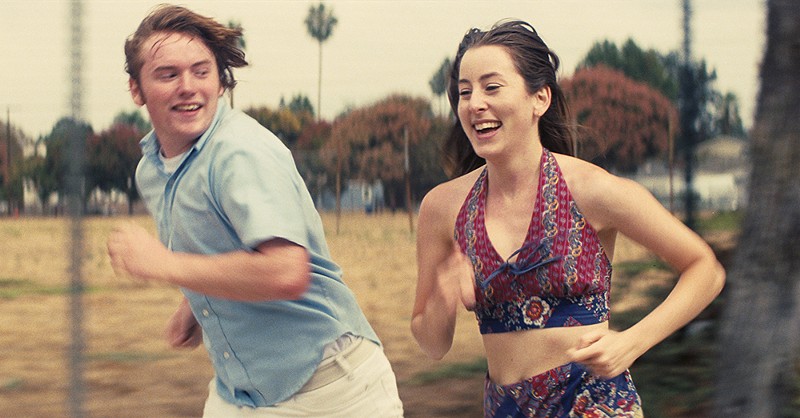For L.A. movies, druggy movies, ’70s movies, and coming-of-age movies, “hazy” has long trended as a recurring descriptor. Licorice Pizza, Paul Thomas Anderson’s newest and most freely written work to date, is all of these — and certainly merits the term.
With its nearly episodic structure, a flood of ardent, conflicted romantic feelings throughout, and a sincere-but-aware willingness to grapple with experiences of youth, love, time, identity, and place, it can seem at first glance vague: not “about” that much, and certainly not driven by plot. (In this, it strikes a sharp contrast with most of his prior works, which include Boogie Nights, There Will Be Blood, and The Master). But Licorice Pizza is both deceptively and deeply funny and sly; not lacking in narrative weight, it accrues heft through experiential precision. By trusting in his characters, both as they’re scripted and as brought into being by the film’s brimming performers, Anderson banks rightly on the potent reserve of lived experience and feeling at the movie’s core.
The gamble pays off, even as the film depends wholly on the abilities and chemistry shared by a pair of first-time screen actors. At its open, Licorice finds twenty-something Alana Kane (played by the pop star Alana Haim, whose parents and sisters also feature) eking out scraps working for a school photo company while living at home. She’s approached at first sight by Gary Valentine (Cooper Hoffman, the son of the late actor and Anderson collaborator Philip Seymour Hoffman), a 15-year old actor beginning to age out of the youth roles he’s made a minor name of. Their rapport is both immediate and sharply competitive, granting their conversation the thrilling sensation of a fencing match, in which constant sparring proves essential and letting down one’s guard necessitates some cessation of ground. With his remarkably finessed bluster, he coaxes her out to dinner. Though Alana assures Gary the two can’t date, they hang together anyway for a host of reasons within and beyond their grasp, slipping from one upstart business venture to another — and another — over a span of at least several months.
For Anderson, as ever, the boundaries between recording, recounting, conjuring, and inventing may as well have been etched out in smoke. An expert accruer of all manner of research, he channels into the film’s world a range of first-, second-, and third-hand knowledge: of his own lifelong experiences in the Valley, of his friend Gary Goetzman’s stories of growing up as a child actor, and of cinematic, musical, and political history. Close analogs to William Holden (Sean Penn) and Lucille Ball (Christine Ebersole) wander through the picture, and the adjacent, ambient presence of the entertainment industry is as much a part of Licorice Pizza’s mottled sense of romance as anything else.
But social reality is part of this picture, too — and without suggesting any reliable correlation between time’s passage and social progress, Anderson quite deliberately lets a bit of rain in by opening a window to a different time. Various forms of racial caricature, casual misogyny, and identity-based pressures all feature — as does an apparent (if not acute) class differential between Gary and Alana. These realities are things that they both — for all their efforts to seem worldly at first meeting — have largely, as suburban white kids, been sheltered from. But the presence of these social realities is crucial, and not just for credibility’s sake or for cutting the nostalgic impulse (both important), but because the terrain the characters move in can only feel real if submerged by culture, such that the latter becomes the water that the character must swim and kick their way through. In moving from one hustle to another across the Valley’s shabby hothouse landscape, Gary and Alana aren’t just negotiating how to run a business, be it an acting career or a water-bed outfit (tricky enough); they’re coming up against first, naive blushes with danger, precarity, and real intimacy, the features and hazards that define an adult’s experience of the world.
This isn’t to suggest that they can, or get to, shed their initial air of mutually competitive and outward-facing performance; that armor’s too useful and too important. Rather, Alana and Gary find themselves making a series of choices about what to privilege and how to present themselves in negotiating with their surroundings and one another. History and social reality stay a part of this, even as they’re all enshrouded — as always in Hollywood — by a smokescreen of recitation, homage, and showmanship.
This is plainer nowhere than in the lead-up to one of the film’s most climactic scenes of spectacle — in which Jack Holden, an actor-producer played by Penn, takes Alana out for a drink (her first martini) after she wings her way through a successful audition. In the woozy, drunken haze of the bar, lines (lies) and truths blur together, obscuring any efforts to name or have a feeling. Over the course of their time together (they never get to food), the old man tells macho, referential stories that seem beyond the bounds of honest conversation, proffering the verbal equivalent of hyperlinks instead of fully invested thoughts or words. (This fixation with reference is as much a mode of filmmaking as it is of conversation — but one that Anderson’s still-literate body of work, in skewing personal, has managed to steer away from). When Alana asks Jack what his stories are from, movies or his life, he simply drones on.
In this scene and the one that follows, Alana’s presented with an option: the choice between Holden’s hard-edged, diversionary, and ultimately grasping male performance and the good, soft stuff of sincere romance. One’s squishier, sure, but each has its own allure, and Licorice does finely at clarifying that no one moment like this proves final or decisive — rather, a lifetime (or season) of experience accrues together into, somehow, a somewhat guiding form. The process is more additive than one of unlearning, as the tools at Alana and Gary’s disposal — the verbal sparring, the lies through interviews and auditions, the glossing of one’s past — aren’t necessarily wrong to use. In a capitalist society, these mechanisms of survival can’t harbor some deeply moral dimension. They instead constitute a kind of necessary showmanship. As documented in plenty of Anderson’s work, they’ve been the tools required for financial and even romantic success in America for ages.
All this makes it a challenge to embrace the pull of unfiltered and frankly forbidden sentiment, the matter confronting our leads — and the struggle to locate oneself and one’s feelings amid the obstacles the world puts up lies right at Licorice Pizza’s core. Anderson’s ability to shoot and write through this is remarkable, as emotionally rich as it is deft, modest, and quietly suggestive. Licorice’s exteriors feel dingy, lush, and shimmering — and the film’s imbued with a constant sense of movement, of hurry, without the answer of a sense of effective transport. When working indoors, he shoots mostly in tinted environments or heavy shadows, showering his performers in sparse but tender blooms of light. A packed, considered soundtrack and Jonny Greenwood’s carefully deployed score back the proceedings throughout. All this, along with the earnest, unvarnished performance of his leads, amounts to a free-feeling but perfectly controlled sense of atmosphere such that every experience feels acute — but shot through with an ambiguous mess of feeling. Whereas in 2002’s Punch-Drunk Love, lens flares ripped across the screen in sharp bolts to connote searing flashes of affection, here the effect (which recurs here) feels both less describable and rooted deeper, harder to precisely place or grasp — and less ethereal, too, for stemming from visible lights in scenes. When a rotating spotlight in one scene swivels to hit Licorice Pizza’s leads, a flare lights up between them. But it’s less clear than in Punch-Drunk just what it signals or means — it’s the sensation and feeling here that counts.
Stay connected with Detroit Metro Times. Subscribe to our newsletters, and follow us on Google News, Apple News, Twitter, Facebook, Instagram, or Reddit.






